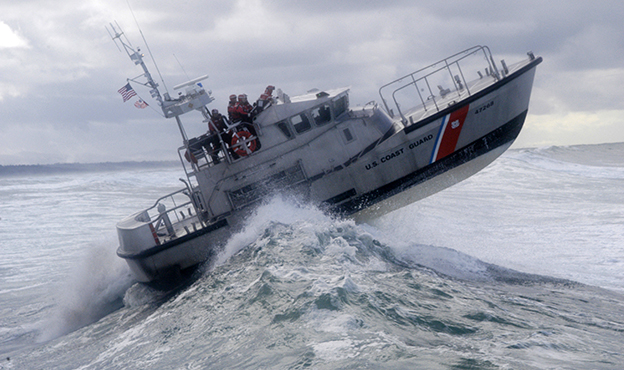
By CAPT Mark Poster and CAPT Joe Derie
Is It Safe To Go Out There?
The Beacon, Issue 65 Fall 2021, California Boating Safety Officers Association
While patrolling your harbor, have you ever been asked on a nice summer day
what the water was like outside the breakwater and if it was all right to go out there?
If so did you casually look at the boater, look out over the water, and remembering the
pleasant seas you rode not long ago, say: “Water’s fine, it’s OK to go out there!”
A seemingly innocuous answer to that question can land you, your agency and
the boater requesting the information in trouble. While it may be OK for you or even
most boaters to go out, there are a lot of boaters who shouldn’t go out and a several
reasons for you to hesitate before you answer that question.
Some points to consider before answering:
1. How long ago were you out there? Has the weather or seas changed? Is
there a front moving in?
2. What time is it? What is the state of the tide and current? What was it like
when you were out there?
3. What was the vessel traffic like when you were out? Light? Heavy? (And how
do you define these terms?) What was the vessel traffic: Pleasure boats?
Tugs with barges? Sports fisherman? Commercial fisherman? Kayaks?
Sailboats?
4. What type of boat are you looking at? How many passengers? What are the
ages, sexes and physical capabilities of the passengers? How is the boat
loaded? How good is the engine and what is the fuel status (Or what are the
sails and rigging like)?
5. What are the boating skills of the vessel’s skipper? Is it someone you know to
be a skilled mariner? A semi-skilled mariner? A mariner who has difficulty just
voyaging around the harbor?
6. Have you ever seen the individual and this boat before? Is he up there for a
weekend? Is the boat his or did he borrow it from a buddy? Did he rent the
boat from one of the marinas?
7. Are the boats’ occupants wearing PFD’s? Are the PFD’s worn correctly? Are
the PFD’s dingy, brand new or still in the wrapper?
8. How is it the boat equipped? Radar? Radio? Cell phone? VDS? Sound
producing devices? Navigation lights working? Does the skipper know how to
use any of this equipment? Does he know when to use this equipment?
A good boating safety officer can probably add more questions to the above list
and follow up with a number of highly professional ways to obtain the answers to all thequestions. The point is should an officer be recommending what a boater should attempt?
This is not a theoretical question. One harbor district is about to be sued because
a harbor patrol officer supposedly told a boater it was OK to go out into open water. The
20+ foot recreational vessel had nine passengers aboard, mostly children. The boat
eventually capsized in the seas and a child drowned, apparently being caught under the
vessel without a PFD. While Rule 6 of the International and Inland Rules obviously
applies here, the vessel’s skipper has no assets while the Harbor District has plenty.
The plaintiff’s lawyer will state it was the Harbor District, in the form of the Harbor Patrol
Officer, who told the poor boater (who trusted this outstanding officer of the law!) it was
OK to go out there and thereby caused the tragedy.
Whether this would work in a court in your district, especially a small district
where many of the jurors might be boaters, is moot. Chances are the suit will be filed in
a more liberal jurisdiction and, without letting it come to trial, the District will settle.
Notwithstanding, the District and the Patrol Officer are in for some rough times.
“Is it OK to go out there?” is not an innocent question. Boating Safety Officers
must seriously consider each and every request prior to answering. And if you’ve read
this far and are relieved because your jurisdiction is an inland lake, not a harbor on the
coast, think again. Saying: “It’s OK to go out on the lake!” could be the cause of just as
much trouble. Think about it, you may not worry about tides and currents but other
considerations are appropriate.
Always you should be frank about the dangers and always you have to be sure
the boater understands it’s his call. Unless, of course, it’s obvious you need to terminate
the voyage. How and when to do that is the subject of a future article.